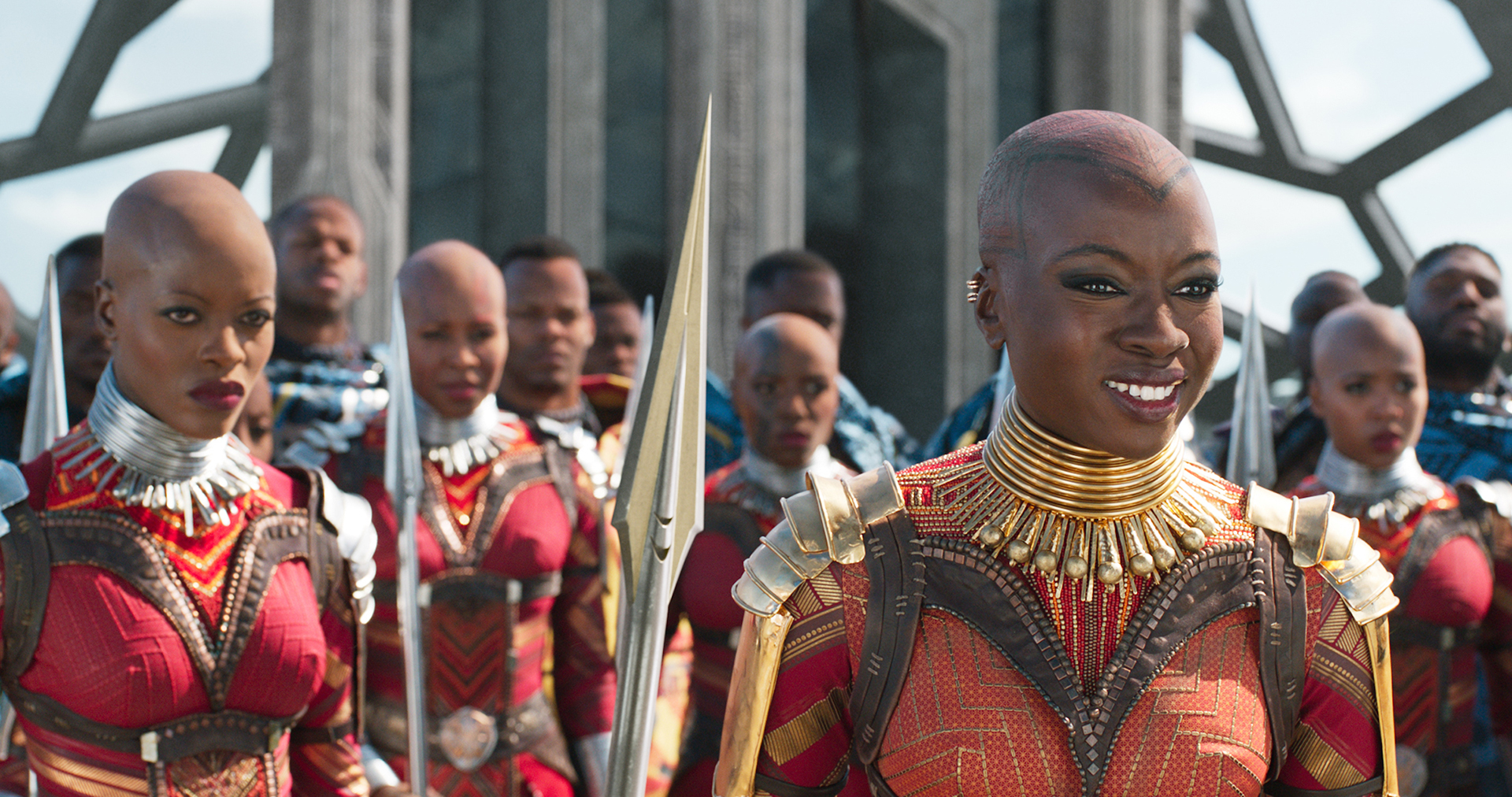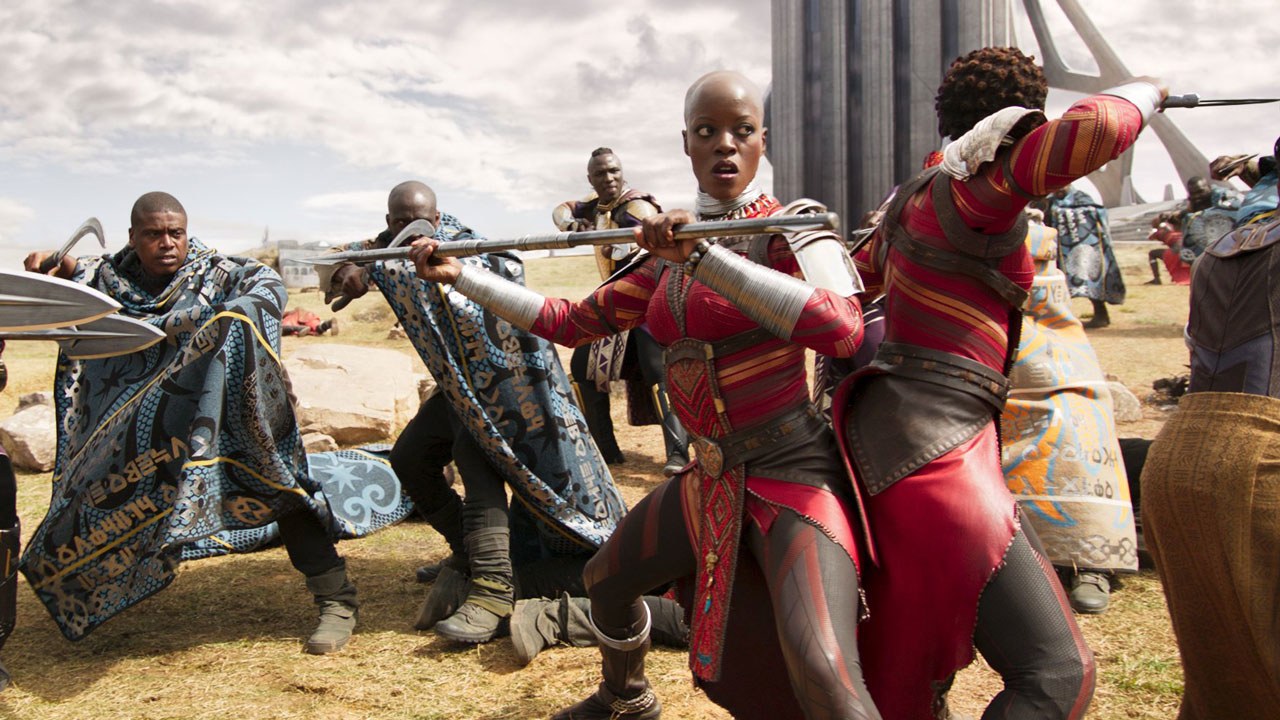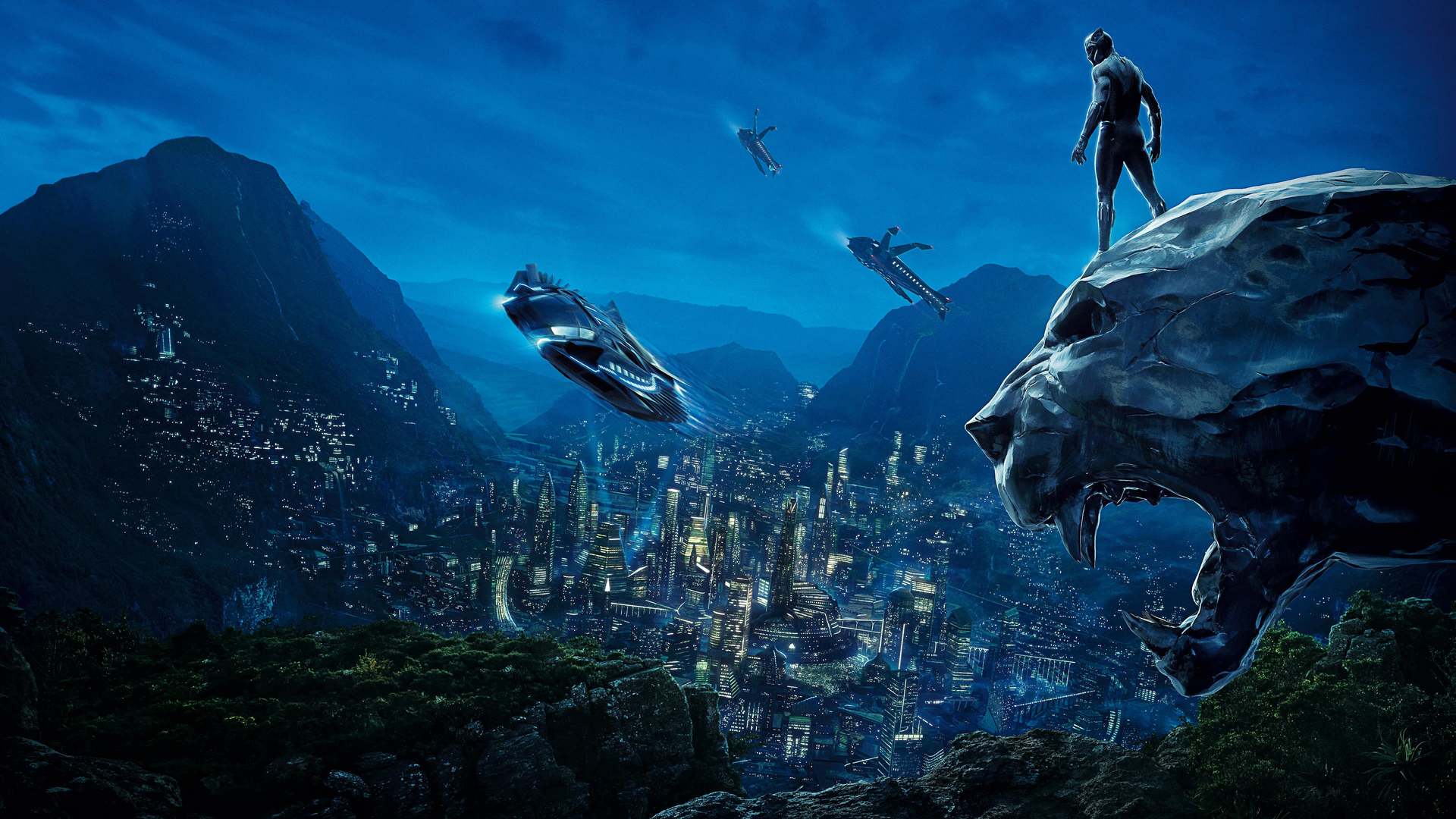Florence Kasumba never needed a flurry of scripted lines to prove that she was a badass—she only needed one:
Videos by VICE
Most of us would have tried to repeat that one-liner facing a superstar like Scarlett (Black Widow), only to falter over the all-intimidating juggernaut of a Captain America: Civil War flick. But Florence entered in with her statuesque stance, evened stare and towering frame that felt like a cocktail of intimidation, power and beauty; she owned that shit.
The Ugandan-born German actress who played Ayo, the Dora Milaje based security chief in Civil War/Black Panther, didn’t enter the picture with a household name in the west. She instead had 20 years worth of acting experience carried on from Germany, several years of dancing experience, and a good amount of fighting experience doing fight-like things in Shaolin Temples and the like.
I always wondered if her superhuman strength was an act—a demand of some script—but after having had the chance to speak with her in promotion of the eventual Black Panther digital (tomorrow) and Blu-ray releases (May 15), I saw the truth; Florence Kasumba is the real deal, and like her Dora Milaje based character Ayo, she can certifiably whoop my damn ass.
VICE: Before anyone knew about a Dora Milaje, you really set the tone of it all with that “move or you will be moved” scene. When the reactions began to come in, what were your thoughts?
Florence Kasumba: (laughs) I didn’t really understand it in the beginning to be honest because I hadn’t watched the film when that scene debuted. The movie itself came out in June and I had only watched Civil War in the summer. So people would react with, “oh, are you the woman from the movie?” and I’d be like, um yeah! People would just keep saying at the briefing, “move, or you will be moved,” to me and I remembered saying it at some point but I only understood the hype once I saw the final cut.
All the think pieces out there and the fan base in general already expressed how great it was to see Black Panther . Now that you’ve had to time to process it, what was it like for you?
I was overwhelmed. There was just so much to take in because I had never seen the movie before the premiere. A lot of times when you’re on a project, you’re given a private screening so you can prepare yourself for when you do PR. But with a lot of us, we were left in the dark as of the end of January, so we were all just trying to understand what we just witnessed. It was a beautiful feeling. Of course, I was relieved because I was able to finally see the film, and I’m still so happy when I talk about it. I’ll of course be getting the Blu-ray because there’s still so many things that I really want to see in detail!

Take me back to when you read this script, and find out about a black king being protected almost entirely by women. It seemed crazy on paper, but how did you take that in?
I understood it right away actually. At the end of the day, I don’t believe in a difference in being protected by women. I understood that it was something that people weren’t used to, but if you had a certain experience, you would have seen it differently. When you have a specific background, like say you’re from China for instance, where a lot of bodyguards are female, it feels like a natural concept. Why? Because when you have a woman somewhere for any reason, they’ll get underestimated and will appear as non-threatening for some reason. People will forget that this one woman might actually be really strong and that she’ll be able to defend the person she’s protecting in every way. So I understood the concept completely and it was very clear to me that every woman needed to be able to work as a unit. Every actress in this film brought with them some background in self-defense. We had some from wrestling, boxing and different martial arts that allowed us to be strong together.
I think I asked because in terms of North American cinema, that look isn’t too common. Especially in relation to black women.
Oh, I completely acknowledge that it was very special because I understand that on top of having women that can fight, we also are women without hair. When you see 16 of us, all these black women with forms of athleticism and the ability to fight and no hair to top it off, that’s something that’s going to look different to a lot of people. For me, as someone with an African background, having a woman with a shaved head is nothing special. In South Africa for instance, I get out of a plane and I’ll see people that look like me everywhere. It all depends on the kind of imagery you’re accustomed to seeing. If it feels foreign, the image may also feel intimidating, beautiful or both. Our reactions under those circumstances are all different.
It was both, not just for you, but for every woman involved.
When you understand how we trained, that makes sense. We started training for a long while before we even started filming the action scenes. Everyone had to bring something to the table because you’re not going to be able to be physically lacking beforehand, and then train just to become the Dora Milaje. That’s not how it works. Before this film I trained at home, and I have always tried to train every day when I got the chance. When I wasn’t doing that, I was doing cardio or something physical. So a lot of it felt natural for me.
So this was natural from you, not just from the view of a look, but also the physicality portion?
I did come from a dance background and I did that for years. At some point, while I still loved dancing, I got introduced to martial arts and really got into kung fu. It’s, of course, a physically demanding activity, but I found a commonality with it because it had the same elegance. In my free time, I’ve always continued to do martial arts because it’s what always made me happy. I mean whenever I’m in Berlin, that’s where I’d train in the Shaolin Temples. When I’m filming somewhere else, I wouldn’t dare go into a different dojo where I could possibly hurt myself because the job just wouldn’t allow it. Before Ayo, I was still doing this.

I really didn’t know all of that as far as the martial arts background. So when did you begin to apply that to film?
Well no one ever knew that I was interested in action. It took me a while to even get around to writing down that I was into tai chi for example. When you put down your skills, you have to be able to prove that you can do that beyond all doubt. So although I trained on a high level, there’s still a big difference between a real martial artist and someone coming from the stunt world. These people do this on a daily basis. I’m an actress for sure, and I’ve been doing that for 20 years, but in unison with other skills. With Black Panther, I was just lucky enough that when we went through bootcamp, they figured out that I could actually take on the stunt work. When we’re there, we basically have nothing to protect our bodies and our costumes are skin tight, so therefore you really need to know what you’re doing.
I remember when I first saw you, there was an air to you that made me understand that you were a soldier. The poster, the attitude, you couldn’t fake that. It often made me wonder what you had to put yourself within to maintain that energy through both films.
I honestly didn’t have to do a lot! If you ask someone what the daily routine is of the Dora Milaje or the daily routine of your basic bodyguard…these people train and it shows. You wake up in the morning and you train to be mentally and physically ready to defend whoever you’re working for. This is what I do. This is what I’ve done. In my case, I do did it because I found a fun out of it and it made me happy. It’s not about self-defense for me, it’s simply because I love the act of movement and anything that fosters movement. Training and then coming to America and doing bootcamp never felt new to me because that’s what I did here anyway.
The main difficulty came in the weapon, because the Dora Milaje work with spears. When I’m home I work with a sword and it’s a weapon that I know well because it’s so much shorter. I had to get used to working with a long weapon, but we took the time to do that. We did basic drills and in light, I know that if you want to do martial arts, there are a lot of movements that you’d think was boring, but if you absorb those basic drills, you can walk on a set and whatever they change things up, you’ll still be able to function. This happens way before filming, and it becomes ingrained.

I’ll readily admit that the film made me cry because I never saw a positive black image like it before. I imagine you felt the same way?
Oh yes, and like I said, I was overwhelmed to see this beautiful world with these beautiful people all in one. That’s something I definitely was not used to. Also the fact that we weren’t portrayed as victims and we were strong characters while being in a modern setting. That’s an image that’s very important. I wish I would have been able as a child to see a film like that because when I grew up in Germany, if I wanted to see someone that looked like me I’d watch The Cosby Show or The Fresh Prince of Bel Air. Now, it’s so much easier for young people to go to a film like Black Panther and say, I want to become this or that because these characters are strong and not criminals. That’s just my mindset. Obviously there will be more movies like this and that’s great. That’s the change.
So any favourite scenes you can’t wait to watch again?
Oh absolutely! My colleague Winston Duke with that scene where he’s like, “I’m kidding. We’re vegetarians,” that’s my favourite (laughs). He is so funny and strong and so spontaneous absolutely perfect timing. I love that scene!
Follow Noel Ransome on Twitter.
This interview has been edited for clarity and length.
More
From VICE
-

CoKane, a cocaine-obsessed wrestler from GTS wrestling, poses with a referee -

(Photo by sdominick / Getty Images) -

-

